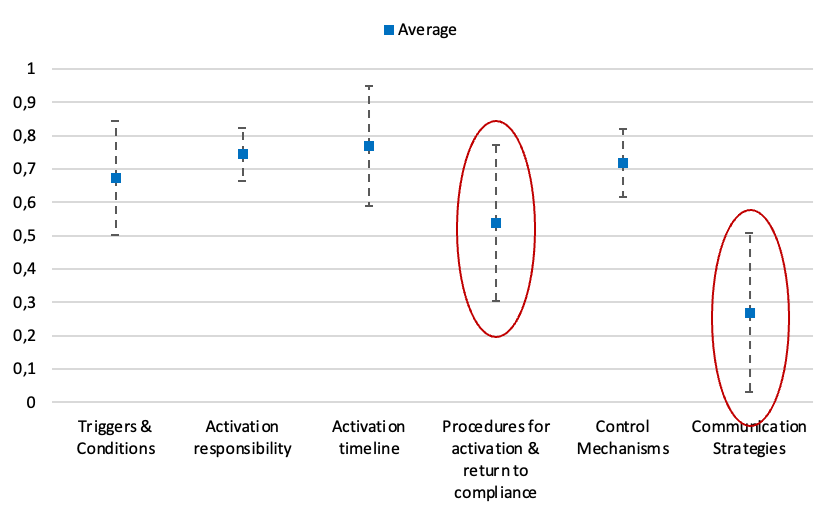In recent years, the global economic landscape has been marked by unprecedented upheavals, including the Global Financial Crisis, the disruptions caused by the COVID-19 pandemic, and, more recently, geopolitical tensions. These crises have tested the resilience of fiscal frameworks, highlighting the pressing need for greater adaptability to navigate unforeseen challenges efficiently.
While fiscal rules are essential for consistency and credibility, they often fail to handle unpredictable crises effectively. The COVID-19 pandemic underscored the critical role of flexibility in fiscal governance. Integrating escape or exceptional event clauses has emerged as a vital mechanism amid these challenges. These clauses, designed to provide temporary flexibility from strict fiscal targets during crises, aim to strike a balance between upholding fiscal rules and effectively responding to unexpected circumstances.
This need for adaptability extends further, considering the escalating consequences of climate change and the rising frequency of natural disasters. Such situations increasingly demand robust fiscal efforts, prompting a reevaluation of the clarity and effectiveness of escape clauses.
Achieving this balance is not trivial, and a crucial question arises: How can the definition and quality of these escape clauses impact a country’s ability to navigate economic shocks while maintaining fiscal discipline?
Clear and well-defined escape clauses, with precise triggers for activation and guidelines for compliance restoration, become essential during periods of fiscal uncertainty. They provide the necessary structure to adapt to exceptional circumstances without compromising long-term fiscal responsibility.
To comprehensively assess the efficacy of escape clauses, we have developed the Escape Clause Clarity Index (ECCI), which will be part of the upcoming study “Navigating Fiscal Flexibility: Assessing the Quality of Escape Clauses in Rule-Based Fiscal Frameworks” by Ulloa-Suarez, Valencia, and Guerra (2024). This index serves as a robust measure, evaluating the precision and adaptability of these clauses across various critical dimensions.
Escape Clause Clarity Index (ECCI)
The ECCI is a tool tailored to gauge the effectiveness of escape clause definitions, ensuring a delicate balance between crisis management, and sustained fiscal responsibility[1]. This index employs a scoring system encompassing six dimensions:
- Triggers and Conditions – Enhancing Clarity in Activation
- Activation Responsibility – Strengthening Authority’s Role for Activation
- Activation Timeline and Return to Objectives – Enhancing Activation Timing and Return Durations
- Procedures for Activation and Compliance – Refining Requirements for Effective Activation and Return to Compliance
- Control Mechanisms – Strengthening Control Mechanisms for Better Accounting
- Communication – Optimizing Communication Strategies for Activation
The evaluation process benchmarks against an ideal standard to assess each country’s escape clause against specific criteria within these dimensions. Higher scores are assigned to clauses closely mirroring the ideal scenario within each dimension. In comparison, lower scores indicate areas requiring enhancement.
The ECCI scale ranges from 0 to 1, with 1 signifying an escape clause closely aligned with the ideal scenario across all dimensions. For instance, an ECCI score of 0.7 signifies a 30% margin for improvement in the definition of the escape clause, pinpointing dimensions that received lower scores.
Assessing the Clarity of Escape Clauses in Latin America and the Caribbean
The ECCI score for the Latin American and Caribbean (LAC) region is 0.62, indicating significant room for improvement towards achieving the best-case scenario (approximately 40% improvement margin). This index serves as a roadmap, showcasing areas where enhancements within each dimension can significantly refine the clarity and effectiveness of escape clauses across the region.
Figure 1 below illustrates the room for improvement in each dimension, as the average scores are far from the ideal score of 1. Closer proximity to zero indicates a greater need for enhancement in a specific dimension.
On average, countries in the region require improvement across all dimensions, particularly in optimizing communication strategies for activating escape clauses. Most crucially, there is a notable need for refinement in the requirements necessary for effective activation and a significant scope for improvement in how to return to compliance after the escape has been invoked.
Figure 1: Escape Clause Clarity Index for Latin America and the Caribbean by Dimensions

Note: The graph presents the average score in each dimension for the 13 countries in the sample. The dotted lines around these averages represent a 95% confidence interval.
An overview of the escape clauses definition in LAC underscores some results:
- Countries demonstrate strength in specifying deviations, modifications, or suspension of fiscal targets and potential activation duration. Yet, there are notable areas for improvement in defining procedures for activation, return to fiscal targets and subsequent compliance.
- While triggers and conditions regarding the escape clauses are generally straightforward, there is room for improvement in framing activation around events beyond government control.
- Countries often involve legislative power in activation and accounting. Still, engaging independent fiscal institutions for impartial oversight would strengthen the authority confirming activation.
- To strengthen the framework’s credibility among diverse economic actors, improving communication ex-ante and ex-post is crucial. This can be achieved by implementing enhanced communication strategies to ensure stakeholders clearly understand the reasons for activation.
Exploring Escape Clauses’ Impact on Fiscal Rule Performance
Studying the ECCI’s relationship with variables like escape clause activation, deviation from fiscal targets, and compliance reveals that well-defined escape clauses significantly enhance the global fiscal rule framework. Key findings include:
- Proactive Activation Strategies: countries with clear, high-quality escape clauses proactively activate them as a strategic safety net. This approach ensures fiscal stability during stable economic periods and swift responses to unforeseen challenges without discretionary use.
- Reduced Deviations from Targets: clear escape clauses correlate with fewer deviations from fiscal rule targets. They play a crucial role in adjusting frameworks during unexpected situations, maintaining fiscal discipline, and upholding policy credibility.
- Influence on Compliance: a clearly defined activation timeline is pivotal in post-escape clause compliance. Well-defined clauses facilitate managing uncertainty by enabling a structured return to fiscal rules and ensuring smoother compliance with established fiscal objectives.
Conclusions and Policy Recommendations
As challenges related from climate change and natural disasters intensify, countries will need to enhance the quality of their fiscal rules to be able to adapt their policies to extreme and unforeseen events.
Escape clauses are an important element of fiscal rules, as they help striking a balance between fiscal rigidity and adaptability, which is crucial for managing economic challenges. Well-defined escape clauses offer clarity and adaptability without compromising fiscal responsibility, precisely guiding activation and return to rule compliance.
That is the reason why we developed the ECCI to help them identify key improvement areas.
Our analysis has shown that LAC countries need to enhance their activation procedures and their return to fiscal objectives. Specific actions such as providing nuanced reasons for activation and delineating alternative deviations are a step closer to improvement.
Countries should also use specific thresholds for economic contractions to guide escape clause activation, ensuring impartial evaluations by engaging independent fiscal institutions. This enhances objectivity and transparency, strengthening the credibility of escape clause implementations. Finally, governments must communicate activation implications and reasons to enhance ex-ante and ex-post communication strategies.
These recommendations will help governments strengthen the effectiveness, transparency, and credibility of the escape clauses within fiscal frameworks, paving the way for greater fiscal resilience and sustainability as countries navigate unexpected economic shocks.
Subscribe to our newsletter to keep yourself updated about our latest publications, blogs and events. Make sure to select newsletters option, after choosing the fiscal policy and management topic.
Learn about how to manage fiscal risks with FISLAC.
Related blogs
How Fiscal Rules Can Reduce Sovereign Debt Default Risk
Complying with Fiscal Rules in Latin America and the Caribbean: From Promises to Action


Leave a Reply